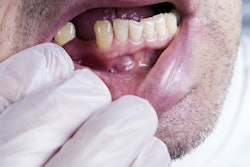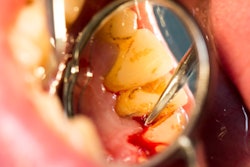
Periodontitis and metabolic syndrome are manifestations of chronic inflammation.
 Alvin Danenberg, DDS.
Alvin Danenberg, DDS.Periodontitis is an advanced stage of gum disease in which the gums are infected and the bone surrounding the teeth is breaking down leading to tooth loss and spread of infection. Metabolic syndrome is a cluster of disorders, including high blood pressure, increased belly fat, high blood triglyceride, low blood high-density lipoprotein (HDL) cholesterol, and increased blood sugar. These disorders can lead to type 2 diabetes and cardiovascular disease.
Could there be a causal relationship between the chronic inflammation of gum disease and the chronic inflammation of metabolic syndrome? The answer lies in the fact that practically all chronic diseases start with inflammation on the cellular level. If chronic inflammation could be brought under control, cells might have the potential to heal.
Definite association
Research published in the Archives of Oral Biology (August 2014, Vol. 59:8, pp. 855-870) and in the Journal of Clinical Endocrinology and Metabolism (October 2008, Vol. 93:10, pp. 3989-3994) has shown that there is a definite association between metabolic syndrome and periodontitis.
A review paper published online in Mediators of Inflammation (February 16, 2015) discussed the relationships between autoimmunity and various chronic diseases, and a paper published online on May 25, 2014, in Autoimmune Diseases described the role of autoimmune responses in periodontal disease.
Possibly reducing the markers for metabolic syndrome will also reduce the prevalence of periodontitis.
“If chronic inflammation could be brought under control, cells might have the potential to heal.”
- In a paper published in 2009 in the Journal of Periodontology (May 2009, Vol. 80:5, pp. 759-768), researchers reported that a Paleo-type diet reduced gingival inflammation, virulent bacteria around the gum tissues, and the depth of gum pockets.
- In 2012 in Diabetes, Metabolic Syndrome and Obesity: Targets and Therapy (July 2012, Vol. 5, pp. 175-189). Ian Spreadbury, PhD, described how acellular carbohydrates (processed grains and sugars) and remnants of harmful bacteria (lipopolysaccharides or LPS) could pass through the intestinal lining to create chronic inflammation.
- In 2014 in Lipids in Health and Disease (October 1, 2014), researchers reported that a Paleo-type diet improved the markers of metabolic syndrome.
Skeptics, and those who strictly adhere to the proof of randomized clinical trials, will argue that currently there is not sufficient long-term evidence to unequivocally verify a causal relationship between a Paleo-type diet and health. There is much research to be done and to be published in peer-reviewed journals before defined causation could be proved.
I don't know how many years it will take for the scientific community to pronounce, "Now it is proved!" Personally, the current published research is enough to convince me. I believe a Paleo-type diet is part of the lifestyle to choose to become and stay the healthiest as our genetic code has designed.
Heal one cell at a time and the body will thank you. The backdrop for my conviction is the 2.5 million years of our species' evolution.
A version of this column first ran on Dr. Danenberg's blog. DrBicuspid.com appreciates the opportunity to reprint it. His book Crazy-Good Living from Elektra Press is available here.
Alvin Danenberg, DDS, practices at the Bluffton Center for Dentistry in Bluffton, SC. He is also on the faculty of the College of Integrative Medicine and created its integrative periodontal teaching module. He also spent two years as chief of periodontics at Charleston Air Force Base earlier in his career. His website is drdanenberg.com.
The comments and observations expressed herein do not necessarily reflect the opinions of DrBicuspid.com, nor should they be construed as an endorsement or admonishment of any particular idea, vendor, or organization.



















